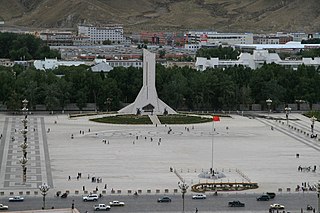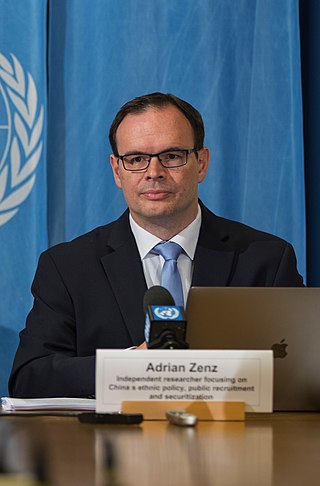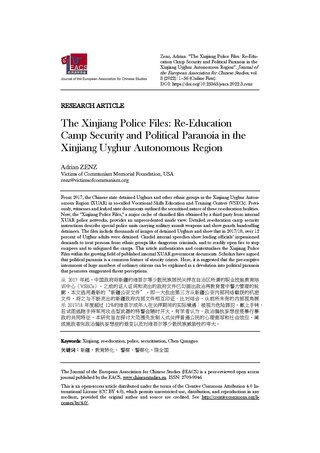Related Research Articles
Human rights in China are periodically reviewed by international bodies, such as human rights treaty bodies and the United Nations Human Rights Council's Universal Periodic Review. The Chinese Communist Party (CCP), the government of the People's Republic of China (PRC), their supporters, and other proponents claim that existing policies and enforcement measures are sufficient to guard against human rights abuses. However, other countries, international non-governmental organizations (NGOs) including Human Rights in China and Amnesty International, and citizens, lawyers, and dissidents inside the country, state that the authorities in mainland China regularly sanction or organize such abuses.

The United Front Work Department (UFWD) is a department of the Central Committee of the Chinese Communist Party (CCP) tasked with "united front work." It gathers intelligence on, manages relations with, and attempts to gain influence over elite individuals and organizations inside and outside mainland China, including in Hong Kong, Taiwan, and in other countries.
Racism in China arises from Chinese history, nationalism, sinicization, and other factors. Racism in the People's Republic of China has been documented in numerous situations. Ethnic tensions have led to numerous incidents in the country such as the Xinjiang conflict, the ongoing internment and state persecution of Uyghurs and other ethnic minorities, the 2010 Tibetan language protest, the 2020 Inner Mongolia protests, discrimination against Africans in particular and discrimination against Black people in general.

After the fall of the Qing dynasty following the Xinhai Revolution (1911-1912), Sun Yat-sen, who led the new Republic of China (1912–1949), immediately proclaimed that the country belonged equally to the Han, Hui (Muslim), Meng (Mongol), and Tsang (Tibetan) peoples. When the People's Republic of China was established in 1949, Chinese Muslims suffered political repression along with all other religious groups in China, especially during the Cultural Revolution (1966–1976).

The sinicization of Tibet includes the programs and laws of the Chinese government and the Chinese Communist Party (CCP) to force cultural assimilation in Tibetan areas of China, including the Tibet Autonomous Region and the surrounding Tibetan-designated autonomous areas. The efforts are undertaken by China in order to remake Tibetan culture into mainstream Chinese culture.
Education in Tibet is the public responsibility of the Ministry of Education of the People's Republic of China. Education of ethnic Tibetans is partly subsidized by the government. Primary and secondary education is compulsory, while preferential policies aimed at Tibetans seek to enroll more students in vocational or higher education.

Human rights in Tibet are a contentious issue. Reported abuses of human rights in Tibet include restricted freedom of religion, belief, and association; arbitrary arrest; maltreatment in custody, including torture; and forced abortion and sterilization. The status of religion, mainly as it relates to figures who are both religious and political, such as the exile of the 14th Dalai Lama, is a regular object of criticism. Additionally, freedom of the press in China is absent, with Tibet's media tightly controlled by the Chinese leadership, making it difficult to accurately determine the scope of human rights abuses.

Chen Quanguo is a Chinese retired politician who was the Chinese Communist Party Committee Secretary of Tibet Autonomous Region from 2011 to 2016 and of the Xinjiang Uyghur Autonomous Region from 2016 to 2021, making him the only person to serve as the Party Secretary for both autonomous regions. Between 2017 and 2022, he was a member of the 19th Politburo of the Chinese Communist Party and was also Political Commissar of the Xinjiang Production and Construction Corps concurrently with his position as Xinjiang Party Secretary.

Antireligious campaigns of the Chinese Communist Party (CCP) are a series of policies and practices, including the promotion of state atheism, coupled with its persecution of people with spiritual or religious beliefs, in the People's Republic of China. Antireligious campaigns were launched in 1949, after the Chinese Communist Revolution, and they continue to be waged against Buddhists, Christians, Muslims, and members of other religious communities in the 21st century. State campaigns against religion have escalated since Xi Jinping became Chinese Communist Party general secretary in 2012. For Christians, government decrees have mandated the widespread removal of crosses from churches, and in some cases, they have also mandated the destruction of houses of worship. In Tibet, similar decrees have mandated the destruction of Tibetan Buddhist monastic centers, sacred sites, and monastic residences; the denial of the Tibetans' right to freely access their cultural heritage; and the ongoing persecution of high Buddhist lamas as well as Buddhist nuns and monks. The persecution initiated in 1999 by Jiang Zemin against Falun Gong continues unabated with widespread surveillance, arbitrary detention, imprisonment, and torture. In Xinjiang, the CCP has arbitrarily detained more than a million Muslims in internment camps. In addition, the CCP's policies have included forced labor, suppression of Uyghur religious practices, political indoctrination, forced sterilization, forced contraception, and forced abortion.

The Xinjiang internment camps, officially called vocational education and training centers by the government of China, are internment camps operated by the government of Xinjiang and the Chinese Communist Party Provincial Standing Committee. Human Rights Watch says that they have been used to indoctrinate Uyghurs and other Muslims since 2017 as part of a "people's war on terror", a policy announced in 2014. The camps have been criticized by the governments of many countries and human rights organizations for alleged human rights abuses, including mistreatment, rape, and torture, with some of them alleging genocide. Some 40 countries around the world have called on China to respect the human rights of the Uyghur community, including countries such as Canada, Germany, Turkey and Japan. The governments of more than 35 countries have expressed support for China's government. Xinjiang internment camps have been described as "the most extreme example of China's inhumane policies against Uighurs".

The Chinese government is committing a series of ongoing human rights abuses against Uyghurs and other ethnic and religious minorities in Xinjiang that is often characterized as persecution or as genocide. Beginning in 2014, the Chinese government, under the administration of Chinese Communist Party (CCP) General Secretary Xi Jinping, incarcerated more than an estimated one million Turkic Muslims without any legal process in internment camps. Operations from 2016 to 2021 were led by Xinjiang CCP Secretary Chen Quanguo. It is the largest-scale detention of ethnic and religious minorities since World War II. The Chinese government began to wind down the camps in 2019. Amnesty International states that detainees have been increasingly transferred to the formal penal system.

The China Cables are a collection of secret Chinese government documents from 2017 which were leaked by exiled Uyghurs to the International Consortium of Investigative Journalists, and published on 24 November 2019. The documents include a telegram which details the first known operations manual for running the Xinjiang internment camps, and bulletins which illustrate how China's centralized data collection system and mass surveillance tool, known as the Integrated Joint Operations Platform, uses artificial intelligence to identify people for interrogation and potential detention.

The Uyghur Human Rights Policy Act of 2020 is a United States federal law that requires various federal U.S. government bodies to report on human rights abuses by the Chinese Communist Party (CCP) and the Chinese government against Uyghurs in Xinjiang, China, including internment in the Xinjiang re-education camps.

Adrian Nikolaus Zenz is a German anthropologist known for his studies of the Xinjiang internment camps and persecution of Uyghurs in China. He is a director and senior fellow in China studies at the Victims of Communism Memorial Foundation, an anti-communist think tank established by the US government and based in Washington, DC.

The Inter-Parliamentary Alliance on China (IPAC) is an international, cross-party alliance of parliamentarians from democratic countries focused on relations with the People's Republic of China (PRC), and specifically, the Chinese Communist Party (CCP). It was established on June 4, 2020, on the anniversary of the 1989 Tiananmen Square protests and massacre. The alliance comprises over 240 members from 27 legislatures and the European Parliament. Each legislature represented takes turns to chair the alliance on a rotating basis. Its purpose is to create a coordinated response to China on global trade, security and human rights.

The Uyghur Forced Labor Prevention Act is a United States federal law that changed U.S. policy on China's Xinjiang Uyghur Autonomous Region with the goal of ensuring that American entities are not funding forced labor among ethnic minorities in the region.
The Xinjiang Data Project is a China-focused Australian research project created and managed by the Australian Strategic Policy Institute (ASPI). The project states that it has identified grave human rights violations in Xinjiang, including the mass detention of minorities, and compulsory sterilizations.

The Xinjiang Police Files are leaked documents from the Xinjiang internment camps, forwarded to anthropologist Adrian Zenz from an anonymous source. On May 24, 2022, an international consortium of 14 media groups published information about the files, which consist of over 10 gigabytes of speeches, images, spreadsheets and protocols dating back to 2018.
The OHCHR Assessment of human rights concerns in the Xinjiang Uyghur Autonomous Region, People's Republic of China is a report published on 31 August 2022 by the Office of the United Nations High Commissioner for Human Rights (OHCHR) concerning the treatment of Uyghurs and other largely Muslim groups in China. The report concluded that "[t]he extent of arbitrary and discriminatory detention of members of Uyghur and other predominantly Muslim groups, pursuant to law and policy, in context of restrictions and deprivation more generally of fundamental rights enjoyed individually and collectively, may constitute international crimes, in particular crimes against humanity." Human rights commissioner Michelle Bachelet released the report shortly before leaving the office.

The Tibet Autonomous Regional Committee of the Chinese Communist Party, also called the Xizang Autonomous Regional Committee of the Communist Party of China, is the regional committee of the Chinese Communist Party (CCP) in the Tibet Autonomous Region. The committee secretary is the highest ranking post in the region. The current secretary is Wang Junzheng, who succeeded Wu Yingjie on 18 October 2021.
References
- 1 2 Mai, Jun (2020-10-15). "Tibetans not obliged to join 'labour transfer scheme', leader says". South China Morning Post. Archived from the original on 2020-10-21. Retrieved 2020-10-21.
- 1 2 3 4 Zenz, Adrian (September 22, 2020). "Xinjiang's System of Militarized Vocational Training Comes to Tibet". Jamestown Foundation . Archived from the original on 2020-09-26. Retrieved 2020-09-29.
- 1 2 "China defends controversial Tibet labour program, urges Tibetans against 'overdoing religion'". Hindustan Times. Reuters. 2020-10-15. Archived from the original on 2020-10-21. Retrieved 2020-10-21.
- 1 2 Chaudhury, Dipanjan Roy (15 October 2020). "China introduces military style labour policy for Tibet replicating Xinjiang model". The Economic Times. Archived from the original on 2020-11-01. Retrieved 2020-10-21.
- ↑ Galloway, Anthony; Bagshaw, Eryk (2020-09-22). "China forces 500,000 Tibetans into labour camps". The Sydney Morning Herald . Archived from the original on 2020-09-29. Retrieved 2020-09-29.
- ↑ Davidson, Helen; agencies (2020-09-22). "Report charts China's expansion of mass labour programme in Tibet". The Guardian. ISSN 0261-3077. Archived from the original on 2020-09-22. Retrieved 2020-09-23.
- 1 2 "China 'coercing Tibetans into mass labour camps'". BBC News. 2020-09-23. Archived from the original on 2020-09-24. Retrieved 2020-09-23.
- ↑ Cadell, Cate (22 September 2020). "Exclusive: China sharply expands mass labor program in Tibet". Reuters . Archived from the original on 6 October 2020. Retrieved 23 September 2020.